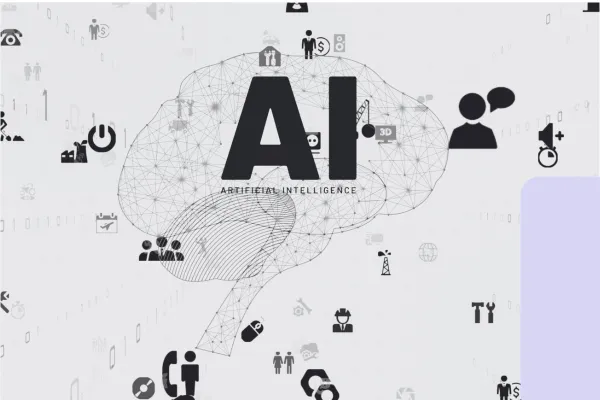Resources
Stay updated with the latest trends and insights in AI automation.
Our blog offers valuable articles, tips, and case studies to help you maximize the benefits of automation for your business.


Essential AI Characteristics You Should Know
AI Characteristics in Simple Terms
Artificial Intelligence, commonly referred to as AI, epitomizes the frontier of technological advancement and human ingenuity.
At its core, AI represents the capability of machines, particularly computers, to perform tasks that traditionally required human intelligence. These tasks include understanding language, recognizing patterns, solving problems, and learning from experiences. Fundamentally, AI aims to replicate or simulate human intellectual processes with remarkable precision and speed.
Characteristically, AI systems hinge on their ability to process vast amounts of data effortlessly. Through sophisticated algorithms and advanced computational power, AI can discern patterns, adapt to new information, and make insightful decisions, mimicking cognitive functions.
Moreover, as AI continually evolves, it transcends mere replication of human tasks, presenting new possibilities for innovation. This progression engenders optimism, hinting at a future where AI enhances productivity, drives discovery, and fosters unprecedented growth across diverse sectors. Such a future illuminates the path towards a world replete with opportunity, driven by the seamless integration of human creativity and artificial precision.
Core Characteristics of AI
At its essence, AI embodies adaptability, a hallmark of its transformative potential, enabling systems to learn. Harnessing the power of vast data sets, AI dynamically refines its understanding, showcasing unparalleled accuracy. This flexibility in decision-making facilitates breakthroughs across myriad disciplines, underscoring AI's pivotal role in driving the next wave of innovation.
Learning Capabilities
AI's learning capabilities are, undeniably, a cornerstone of its transformative power. It navigates vast information landscapes, continually adapting and refining its knowledge base with remarkable precision.
In leveraging extensive datasets, AI systems can dynamically improve, utilizing algorithms to recognize patterns and make predictions with increasing accuracy. This adaptability fuels continuous improvement and innovation.
AI systems can learn and evolve independently, drastically reducing human intervention. This self-improving nature ensures that AI remains at the forefront of technological advancement. As AI learns and evolves, it unlocks new potentials, driving innovation across countless fields. This continuous evolution promises a future of greater efficiency and unprecedented growth.
Problem-Solving Abilities
AI’s problem-solving abilities are its most formidable and game-changing attributes, transforming traditional methodologies across various domains.
Data Analysis: AI can sift through massive datasets, identifying patterns and correlations beyond human capability.
Predictive Modeling: Utilizing historical data to predict future outcomes with high accuracy.
Optimization: Continuously finding the most effective solutions to complex problems.
Automated Reasoning: Applying logical rules to make decisions based on given data.
Adaptability: Quickly adjusting to new data and circumstances to refine outcomes.
These characteristics enable AI to address challenges with efficiency and precision, often surpassing human capabilities.
AI consistently delivers innovative solutions, pushing boundaries and achieving remarkable outcomes.
Narrow AI Explained
Narrow AI, also known as weak AI, excels in one specific domain. It is meticulously designed to perform a single task exceptionally well.
These systems are behind popular applications like virtual personal assistants.
They may include voice recognition software, recommendation algorithms on streaming platforms, or customer service chatbots. Despite their efficiency, they operate within a tightly defined scope.
Their specialty lies in their profound optimization for particular functions, making them invaluable assets that streamline operations and enhance user experiences. Narrow AI transforms complex tasks into manageable processes, making previously insurmountable challenges achievable.
Characteristics of General AI
General AI, envisaged as possessing a broader cognitive horizon, aims to perform various tasks that require human-like reasoning.
It embodies the potential to mirror human thought processes seamlessly.
Such an AI distinguishes itself through adaptability, learning from diverse experiences rather than adhering to strict guidelines. As it interacts with different environments, it exhibits a depth of understanding, fostering decision-making capabilities akin to humans.
Although still theoretical, the pursuit of General AI represents a paradigm shift in computational intelligence. It holds the promise of revolutionizing numerous sectors by offering unprecedented flexibility, creativity, and problem-solving prowess, ensuring a future where technology not only complements but also augments human endeavor.
AI and Natural Language Processing
AI and natural language processing (NLP) represent a remarkable confluence of technology and linguistics, empowering machines to understand and generate human language.
These systems use sophisticated algorithms to interpret context.
By leveraging machine learning, AI deciphers language patterns, enabling applications ranging from chatbots to advanced translation services, demonstrating extraordinary proficiency and adaptability.
The ability of NLP to enhance communication offers transformative potential in diverse industries. From personalized customer engagement to streamlined operations, it is poised to redefine efficiency and innovation in remarkable ways. Such advancements create boundless opportunities, making AI-driven communication a cornerstone of future technological evolution.
The Role of Algorithms in AI
Algorithms form the backbone of artificial intelligence, serving as the fundamental building blocks that drive innovation and efficiency.
First and foremost, algorithms in AI act as meticulous architects, meticulously constructing and continually refining patterns. These mathematical instructions power processes from data analysis to decision-making, reflecting the quintessential nature of AI characteristics. Intricate algorithms enable systems to learn, adapt, and evolve, showcasing the transformative capabilities AI holds in modern technology.
Consequently, these systems exhibit a profound ability to process vast datasets. Through self-improving techniques, algorithms allow AI to uncover insights previously hidden or ignored by traditional means, thereby unlocking an unprecedented avenue for progress and discovery.
Thus, the pivotal role of algorithms in AI cannot be overstated. They are not just an abstract concept but a tangible force driving exceptional advancements. By decoding complex data and executing sophisticated tasks, algorithms empower AI to not only meet but exceed expectations, charting a path towards a more intelligent, efficient, and innovative future.
AI Characteristics in Everyday Applications
AI's most remarkable characteristics, such as natural language processing, enable virtual assistants to respond intelligently. Machine learning algorithms power personalized recommendations, enhancing user experiences across various platforms. Furthermore, predictive analytics in AI supports better decision-making, reflecting its transformative impact on daily tasks.
Virtual Assistants
Virtual assistants represent a prominent embodiment of AI characteristics, significantly enhancing user productivity and convenience.
Voice Recognition: Understanding and processing spoken commands.
Natural Language Processing (NLP): Comprehending and responding to text or speech in human languages.
Task Automation: Handling routine tasks efficiently and swiftly.
Personalization: Customizing responses based on user preferences and behavior.
Integration: Seamlessly connecting with various applications and services.
These advanced AI capabilities enable virtual assistants to provide unparalleled support in both personal and professional spheres.
By learning from interactions, virtual assistants continually improve their functionality and user experience.
Recommendation Systems
Recommendation systems are pivotal in personalizing user experiences.
By analyzing user data, these sophisticated systems create a tailored content strategy, enhancing customer satisfaction and engagement. They are instrumental in sectors across the board, such as e-commerce and streaming services, transforming how products and content are presented to the user.
Intelligently identifying patterns in user behavior, recommendation systems make predictions that are remarkably accurate. This empowers businesses to offer highly relevant suggestions, thus boosting loyalty and retention through sustained personalization.
Effectively implemented, these systems can improve sales, user satisfaction, and operational efficiency. Their ability to sift through vast amounts of information and present only the most pertinent options not only saves time but also amplifies the overall user journey. Through their strategic deployment, organizations can harness the power of AI to foster growth, innovation, and a competitive edge.
Ethical Considerations in AI
Understanding AI characteristics inevitably leads to ethical deliberations, particularly about the responsible use of such advanced technologies.
For instance, an AI system's capability to analyze vast datasets raises questions concerning privacy and consent, highlighting the importance of ethical standards in data handling. It is essential that these systems are designed with transparency in mind to safeguard against potential misuse.
Moreover, fairness in AI decisions is a crucial ethical consideration. A system must be free from biases that can inadvertently perpetuate discrimination. Ensuring diversity and fairness in training datasets is pivotal in achieving equitable AI solutions.
Thus, as AI continues to evolve, it is incumbent upon developers, policymakers, and users to prioritize ethical considerations. This focus will help steer AI advancements towards beneficent applications while mitigating adverse effects, thereby contributing positively to society at large.
How AutoMEE Can Help Navigate AI Challenges
As AI continues to shape various industries, having a partner who understands both its potential and its pitfalls is essential. AutoMEE offers tailored solutions to help businesses implement AI technologies effectively while navigating the ethical and operational challenges that accompany them. By leveraging AutoMEE’s expertise, organizations can ensure their AI systems are not only powerful but also responsible, driving innovation without compromising ethical standards. Visit AutoMEE's Services to learn more about how we can help your business make the most of AI.
Future of AI: Emerging Trends
As they peer into the future, emerging trends in AI reveal promising avenues that could revolutionize various sectors and resource utilization.
One noteworthy trend is the integration of AI in healthcare, offering unparalleled diagnostic accuracy, personalized medicine, and efficient patient care management. This transformation promises to enhance healthcare accessibility and improve overall patient outcomes, heralding a new era of medical advancements.
In transportation, AI’s potential is on a transformative trajectory. Innovations such as autonomous vehicles, intelligent traffic management systems, and predictive maintenance are set to redefine travel, boost safety, and reduce environmental impact.
Moreover, AI is fostering more sustainable practices by optimizing energy use and enabling smart agriculture. These trends signify a future where AI not only drives economic growth but also aligns technology with ecological sustainability, fostering a balanced and thriving global ecosystem.
AI in Various Industries
AI's impact transcends healthcare, finding applications in finance, manufacturing, and education. Financial institutions utilize AI for fraud detection, risk assessment, and personalized banking experiences, showcasing its versatile benefits.
In manufacturing, AI-driven automation streamlines production processes, enhances efficiency, and ensures better quality control. Meanwhile, in education, AI tools deliver customized learning experiences, aiding teachers and empowering students, thereby transforming traditional educational paradigms.

UK - LONDON
The Leadenhall Building
122 Leadenhall Street
PL - GDANSK
Oliva Business Center
Grunwaldzka
472

© 2024 Automee.
All rights reserved.
Services
Sales With AI
AI Customer Support
HR With AI
Back Office Automation
Stay Connected With Us
US - NEW YORK
autoMEE LLC - 244 Madison Avenue, NY
+1 646 687 2961
+1 646 846 8711
UK - LONDON
autoMEE LTD - 122 Leadenhall Street, London
+44 78 6213 9448
+44 74 8889 9833





